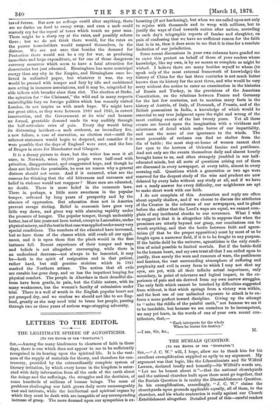LETTERS TO THE EDITOR.
THE LEGITIMATE SPHERE OF AGNOSTICISM.
[TO THE EDITOR OF THE "SPECTATOR."] SIR,—Among the many hindrances to clearness of faith in these days, there is one which does not appear to me to be sufficiently recognised in its bearing upon the spiritual life. It is the vast- ness of the supply of materials for theory, and therefore for con- troversy, provided by the extraordinarily complete system of literary irritation, by which every house in the kingdom is satur- ated with daily information from all the ends of the earth about the doings and the sufferings, the struggles and the destinies, of some hundreds of millions of human beings. The mass of problems challenging our faith grows daily more unmanageably vast and intricate, while the intellectual and spiritual organs by which they must be dealt with are incapable of any corresponding increase of grasp. The mere demand upon our sympathies is ex- hausting (if not hardening), but when we are called upon not only to rejoice with thousands and to weep with millions, but to justify the ways of God towards nation after nation, according to each day's telegraphic reports of famine and slaughter, on pain of confessing that we have no sufficient reason for the faith that is in us, then it does seem to me that it is time for a resolute limitation of our jurisdiction.•
Some recent discussions in your own columns have goaded me to enter this protest on behalf of those of your readers whose knowledge, like my own, is by no means as complete as might be wished. I believe there are many besides myself to whom (to speak only of the most external framework of knowledge) the history of China for the last three centuries is not much better known than its history for the next three, and who would be very sorry without due notice to enter an examination in the histories of Russia and Turkey, in the provisions of the American Constitution, on the relations between France and Germany for the last few centuries, not to mention many facts in the history of Austria, of Italy, of Denmark, of Prussia, and of the British possessions in India, a knowledge of which would be essential to any true judgment upon the right and wrong of the most exciting events of the last twenty years. Yet all these events are forced upon the imagination with a vividness and minuteness of detail which make havoc of our impartiality, and cast the sense of our ignorance to the winds. The most peaceable of recluses can find no shelter from the din of battle ; the most stay-at-home of women cannot shut her eyes to the horrors of Oriental famine and pestilence. And not only are the events themselves daily and almost hourly brought home to us, and often strangely jumbled in our half- educated minds, but all sorts of questions arising out of them are discussed in every newspaper, at every table, almost in every morning call. Questions which a generation or two ago were reserved for the deepest study of the wise and prudent are now debated by every babe without any study at all, and if we have not a ready answer for every difficulty, our neighbours are apt to make short work with our faith.
I do not complain of this. Accusation and reply are often
about equally shallow, and if we choose to discuss the attributes of the Creator in the columns of our newspapers, and to plead before the editor that the Lord's ways are equal, we cannot com- plain of any incidental shocks to our reverence. What I wish to suggest is that it is altogether idle to suppose that when the premisses are utterly beyond our grasp, our conclusions can be worth anything, and that the battle between faith and agnos- ticism (if that be the proper opposition) must by most of us be fought upon a narrower field, if it is to be fought to any purpose. If the battle-field be the universe, agnosticism is the only condi- tion of mind possible to limited mortals. But if the battle-field be the human heart, and my own trust all that I am called upon to justify, then surely the wars and rumours of wars, the pestilences and famines, the vast surrounding atmosphere of suffering and perplexity and evil in every form to which I may not shut my eyes, are yet, with all their infinite actual importance, only secondary, in point of relevance and logical impact, to the ex- perience of pain and sin derived from my own narrow struggles. The only faith which cannot be touched by difficulties suggested from without, is that which springs from a victory won within, and the best use of our unlimited exposure to attack is to en- force a more perfect inward discipline. Giving up the attempt to "solve the riddle of the painful earth," not because we see it to be insoluble, but because we see ourselves to be incompetent, we may yet learn, in the words of one of your own recent con- tributors, that,—
"Each interprets for the whole When he learns his destiny."


































 Previous page
Previous page